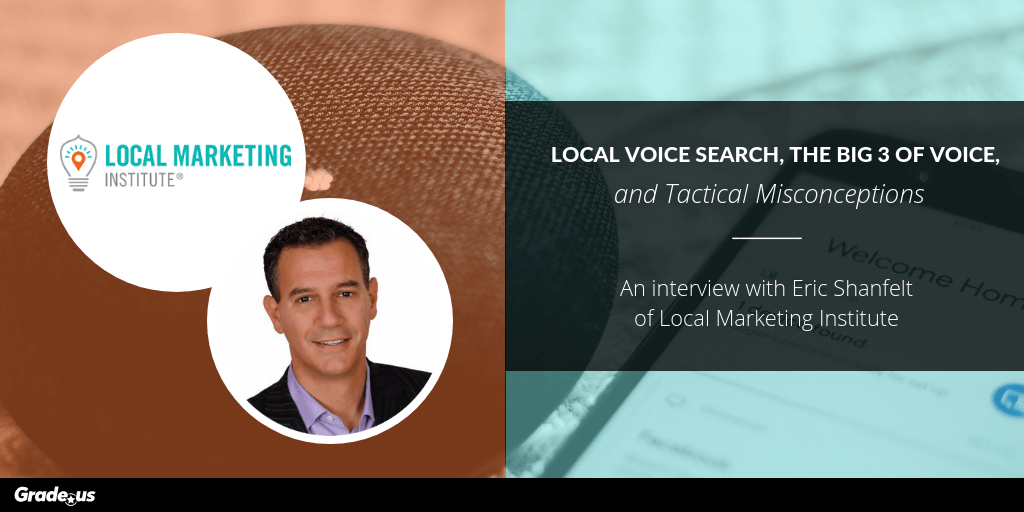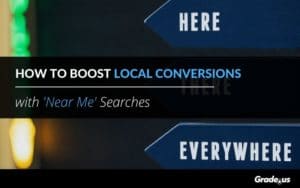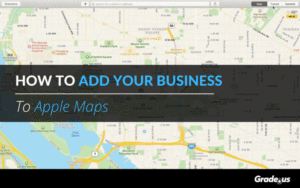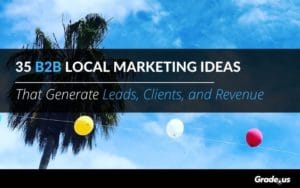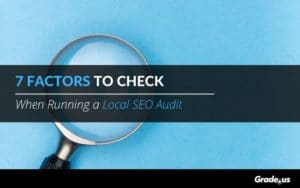Garrett: Before we even dive in, why don't you tell me a little bit just generally about Local Marketing Institute, what the website does, who it's for, and the value your content provides.
Eric: You bet! So Local Marketing Institute was founded about four years ago. Our purpose is to educate local businesses and marketing agencies on effective local marketing techniques for local businesses.
We have a weekly webinar series that is completely free that people can attend. We also have our archived library and our training sessions, with over 90 training sessions available to our paid VIP members.
I want to clarify that local does not just mean "small."
A local business, as you know, is anybody who can interact with customers face-to-face, either at their place of business or their customer's place of business. It could be a small Mom and Pop retailer. For example, it could be a large national chain like Applebees, or Public Storage. It could be a plumber or those type of people.
I just want to clarify it, because a lot of people think local equals small. That's not necessarily true.
So that's what we focus on. We're really dedicated towards education, we're not an agency, and we don't sell software.
On Voice Search in Essence Being a New Interface
Garrett: I think that's great, and I think you really kind of hit the nail right on the head too. It's important to identify those types of businesses and how they do local marketing differently. They face different challenges.
Obviously the challenge for a Mom and Pop single location business is different than the challenge for a 4-5 location business in a certain geographical location versus a nationwide franchise, versus a nationwide brand that has locations on every corner, like Starbucks.
They all still need to focus on their local marketing strategy.
Eric: Yeah, there's fundamentals, and then obviously there's some nuanced differences when you're managing multiple locations vs. a single location (and whether you're doing it as a franchise). As you know, for different franchises, the corporate office controls some aspects of marketing and the individual franchisee controls some aspect of marketing.
But in general, the tactics these local businesses need to execute remain the same. Naturally, local search is a big part of that. How do people find local businesses near you, whether they're looking specifically for your business (a branded search), or whether they're doing a discovery search, a keyword search? Take a query like "Thai restaurants near me." That's when we get into the whole voice search.
With voice becoming a bigger way people are using devices, how does that impact the local search environment, and what do businesses small and large need to do to optimize themselves for voice search?
Garrett: I'm glad you got around to the theme of this interview!
Voice search now almost feels like a buzz term. In the same way that people talk about, "Oh you have to start doing video," oh, you "have to start doing voice search."
You've actually done a lot of research on voice search. As it becomes a growing trend, how much do local marketers need to pay attention to it?
How much does it play into the way people are discovering those businesses compared to just a desktop search, or a mobile search?
Where does voice search come into play and where do you expect it to go in the next year, two years, five years?
Eric: Right, so voice search I think is core. It's just another type of interface.
Whether you're talking desktop or mobile search, you're still searching for a local business. You just happen to be using a desktop device or a local device to do the input. Typically those are textual searches, right? You're typing something in.
Voice search takes the text out of it. Now you're using voice assistants like Apple's Siri, Google assistants or Amazon Alexa. You're simply asking the device for local businesses.
If I were to go right now on Siri and say, "Hey Siri, find me a Thai restaurant near me," it would give me a list of results back. I might go onto my Amazon Alexa and ask for the phone number of my accountant. It would give back information based on the voice search, rather than me typing something in.
The difference is that it's a different interface into local search rather than typing something into a browser or using something like Google maps.
On the 3 Big Players of Voice Search: Google, Apple, and Amazon
Garrett: Absolutely. So the adoption of a new interface doesn't always catch on. Sometimes it does. We saw Google Glass had a brief moment and then disappeared.
Voice is being adopted.
So what have you seen with the adoption of it? What are the demographics? Who is using voice search, and how are different audiences using voice search differently?
Eric: Yeah, so voice search is certainly...it's here. It's definitely here.
Amazon Alexa is probably the one that's introduced the most people to it, it's done the most PR about it. But in general, voice search is becoming part of an everyday routine.
For example, a great study was done by PricewaterhouseCoopers says that 65% of 25-49 year olds use voice interface on their device at least once a day. That's even true for younger demographics, 18-24 year olds and 50+ year olds are only slightly less than that.
We're saying 60% to 65%, 2/3rds of people out there are utilizing the voice interface on their various devices every single day. If you get into that even more deeply, there's some local research that has been done.
BrightLocal's done some good ones on this, there's other ones from other companies out there. But one of the basic stats is something like 60% of consumers have used voice search to find local businesses in the past year.
So, bottom line, people are using it. They're using voice to find local businesses.
I think the biggest thing that people have a misconception on is, "What devices are people using?"
People are using it. They're using voice interfaces. They're using voice assistants almost every single day, and they're using it to find local businesses.
For Google a voice search that includes a "near me" query is a local search. But the biggest thing is, what are the biggest assistants out there? What are the biggest voice platforms out there?
Everyone thinks Amazon Alexa is the biggest platform. But it's not. Not by a long shot.
If you're talking like, dedicated home speakers, dedicated home devices, yeah, Amazon dominates that. They're by far the market leader on that.
But the biggest interfaces for voice search are actually mobile phones, not dedicated speakers. If you take in the entire voice search ecosystem, which includes phones, desktop speakers, also includes other devices, right, it could include cars. Cars have interactive voice assistants now. Smart TVs and smart appliances, for example. I include all of those interfaces, the two biggest being the home speakers and your phones and tablets.
Apple. Apple Siri by far and away has the largest market share. So Siri has 44% market share in voice assistant usage. Google is second, Google assistant is second at 30%, and Amazon Alexa is in third at only 17% market share. Then you've got a couple of small players out there. You've got your Cortana from Microsoft, Samsung Bixby both at 4-5%.
But I think the key thing is if you're thinking about optimizing for local business or as a local marketing agency: how do I optimize business locations so they can more easily be found by search?
You wanna focus on the three big ones. Apple, Google, and Amazon.
On the Nuanced Differences Between the Voice Search Big 3
Garrett: That's great. The really interesting next step question on that is that they're each different search engines, and they provide different types of result, what are the nuances between the different types of search results from these voice searches, these three major players business owners should know about when they're trying to optimize?
Eric: So it depends on the device you use and the kind of factors you're using there. The most important thing that people need to realize is, you're right, if we're talking Apple, there's three primary voice search engine ecosystems.
Apple, Google, and sometimes Amazon.
Garrett: Right.
Eric: When you're just doing like a speaker for example, they're going to give you back, either 1) they're experimenting with maybe one, two, or three location results. But what's the primary listing? What's the number one spot, in there?
If you're using a phone device, if you're using Google assistant on your phone, or you're using Apple Siri on your phone, and you do a search, it will return a list of results. It's very similar to what you'd see if you did a search in Google maps or a search on a web browser.
So, what you've gotta do is say, "Ok, well, what special do I need to do to optimize for voice search."
The answer is: nothing that you're not doing already to optimize for regular search.
The one thing I want to make sure people know is that people are always asking "What are the ranking factors on this?"
And you're aware of this, Garrett...
Garrett: Yep!
Eric: Just like voice search, just like searching on your phone, the number one ranking factor is the proximity of the business to the person doing the search.
So, my phone's got GPS on it, Siri knows it, Google knows about it, Apple knows about it. With Amazon Alexa, I've actually put in my specific location when I set up the device.
These devices know where I'm searching from, and so they're going to give me businesses that are typically closer to me and my location. That's really no different than if I were to use Google maps, or if I were to use a web browser interface to search.
A lot of people forget about that, and they get all freaked out by, "Well, why isn't my business showing up?"
I want to reiterate whether it's voice search or another search, it's still the proximity of the business that's still one of the primary ranking factors as to whether you're going to show up on that list on Siri, or on Google voice.
There are some things people need to know about each specific ecosystem that we can dive into if you want to.
On How Specific Local Marketing Tactics Apply To Voice Search
Garrett: Well that's what I'd be curious about, because to your point, they're just general digital marketing tactics.
So I guess my question would be, for those tactics and how they play into voice search, to what extent is it about Google attributes for the Google My Business listing, versus starting to apply more schema markup, like local attributes of schema to their website? What are some of these tactics that they should be doing anyway in their local marketing that would apply to these voice search ecosystems?
Eric: All of these things apply. All the things you'd do for normal local search engine optimization apply, whether someone's doing it via a textual interface in the browser on Google Maps or Apple Maps, or whether it's someone doing it via a voice search.
All the things you would do normally, still apply in voice search. I think that's the most important thing I want people to understand.
Don't think you're going to have to get out there and do something unique, something special, just to optimize well in voice, versus what you would do for regular local SEO.
It is important, though, to talk about the three different ecosystems. We know for instance on desktop devices, Google's market share hovers around 60% or 70%. Bing is pretty high up there. So you pay a little more attention to Bing for desktop users.
Obviously Google is the 800 pound gorilla.
We know that on mobile search, Google dominates. So optimizing Google My Business is a key strategy.
For desktop and for mobile users, make sure your Google My Business listing is as optimized as it can be. Do all the other things you need to do for local search, but I do want to bring up the two other big players in here.
Apple and Amazon.
With Apple, the big thing I think people want to know over there is that 44% of voice search is being done on Siri. Also by the way, Apple Maps is actually used more on mobile devices, on iPhones, than Google Maps. So you really optimize for the Apple infrastructure.
A lot of businesses have not claimed or optimized their Apple business listing, which is on Apple Maps Connect.
Apple's revamping this whole thing, but a lot of businesses for voice search, number one, get your Google My Business listing done, yes, that'll help you with Google, and the Google Assistant ecosystem.
For Apple though, for Apple Siri and Apple maps, make sure you've got that Apple Maps Connect listing claimed and optimized as much as you can.
I would also recommend you do a voice search on Siri. Look at the results. You will see the basic business information the name, address, phone number (NAP), hours of business, that's all pulled straight from Apple Maps Connect.
If you don't claim your listing, Apple obviously grabs that information from the big data aggregators. But you really want to claim and own that listing outright.
When you do a local business search, look at the results you get off of Siri. You will see there's photos, and you will see reviews.
On Where Reviews Come Into Play Within the Voice Search Ecosystem
Garrett: That's where I was going to go. I was curious about how reviews play into the Apple ecosystem.
Eric: Yeah, you hit the nail on the head here. Now, Apple has several different relationships, but for most local businesses and most business categories, they actually get photos and reviews from Yelp.
Sometimes info will come from TripAdvisor, but they'll see photos and reviews coming from Yelp. So if you were going to optimize for business, for voice search for the Apple platform on Siri, you've got to not only claim and optimize your Apple Maps Connect, but you also need to really claim and optimize your Yelp listing.
You need to have a reputation strategy, for reviews, that includes Yelp, not just Google My Business.
Garrett: That's a major challenge for business owners, yeah.
Now do you think, getting a little into the prediction business, do you think that will continue to be the case, or do you imagine at some point Apple would move away from Yelp for depending on review rankings?
Eric: Well, I know that Apple is in the midst of revamping their whole Maps ecosystem. I would hate to pontificate. The answer is, "I don't know."
If Apple really went for it, and they put dedicated resources behind it, I could see them saying, "Yeah, we're no longer relying on indications from this other platform, we're going to start just doing this data ourselves."
That being said, Apple, like Google, has a ton of irons in the fire, and I'm not sure how much local search and local businesses are really playing into their long-term strategic plans. It seems like they're investing more in the media side of things: music, video, Apple TV, all those kind of things.
I don't have any inside information. I just know what it is right now. And what it is right now is they are relying upon Yelp primarily for photos and for reviews.
By the way, I'm not necessarily a huge fan of advertising on Yelp, but there is one package on Yelp that obviously businesses might want to consider: the enhanced listing, where you can actually control the photos.
Right now, as a business owner on Yelp, you have zero control of the photos that Yelp picks to show as your primary photo for your business. Both on Yelp and where they syndicate content.
But if you do get that Yelp enhanced business package, I think it's something like $26 a month, $29 bucks a month, you can control the photos. That's one investment businesses might consider, just because it can help them better control the featured photos that comes up. When someone does a search, those photos get syndicated to Yelp, Bing, and Apple Maps.
Just some food for thought there. It's not critical to search engine optimization, but can help your business look better in the search results.
Garrett: But that's really interesting. How you really need to consider your Yelp review portfolio and how that correlates with any sort of visibility on Apple products.
Eric: Yeah. You do. And I mean, Yelp is good for some businesses in and of itself. I know Yelp sometimes gets a bad rap. That whole billion dollar bully thing.
By the way, Jason Brown is going to be on with us next week, talking about that whole movie and some of the fallacies in there. All that aside, Yelp syndicates to a lot of people, the reviews, and the images.
Really when you're optimizing your Yelp listing, you're not just optimizing for Yelp and their users, you're also optimizing for Apple Maps, Apple Siri, and you're helping optimize your listing in Bing (which again still has 20-25% market share for desktop users).
On the Current State of Voice Search Advertising
Garrett: Right, absolutely. I think it's interesting when you bring up the point about Yelp advertising.
I wanted to kind of segue back to Google. We're starting to hear about Google including advertising in their voice search results.
What have you heard in terms of, local service ads or any types of ads that are coming up from Google assistant results, and what recommendations do you have for business owners? Is that something they should pay attention to?
Eric: We haven't done a whole lot yet on looking at service ads or other ads showing up in voice search results. That's an interesting thing. It's on our radar to dive into a little bit more, so I don't know if I can speak more to that at this point.
It would not surprise me, though, to see Google monetize the interface as it begins to grow. The rumblings out there right now is that Google is starting to look at some Yelp-like page features in your Google My Business listings. It wouldn't surprise me to see that ultimately extend over to voice search, with local search ads being a completely separate thing, and with local service ads being completely separate.
Garrett: Right. So it's not really...you wouldn't say it's a pay-to-play type of channel yet, but it could turn around really quick.
Eric: Right. Not at this point. With voice being just another interface into Google My Business and Google Maps, I haven't seen it monetized a whole lot, but it's not pay-to-play yet.
On How Amazon's Alexa Fits Into the Voice Search Picture
Garrett: Right. You've done a really good job highlighting there's opportunity in voice search, but there's really no difference compared to any other local marketing or local search tactics.
Eric: There is one exception to this though. Because in the voice search ecosystem there's a new player: Amazon. Amazon Alexa.
Now granted, they're only 14%-15% market share in the voice search market right now. But it is a new player, and right now Amazon has also been getting its local business results from Yelp. That's another thing that people want to think about.
With their Yelp listing, if you optimize your Yelp listing, you've got a big input into the Amazon ecosystem as well.
Yelp actually has maneuvered their way into Amazon's results, because they're syndicating a lot of their data, into these various ecosystems.
Now there has been another player, and that's Yext. Yext now directly submits information into Amazon Alexa. I'm not sure if it's exclusive, but I know they were certainly the first ones to do it.
Amazon Alexa is now beginning to build out its own database of local businesses. Certainly they're syndicating from the big business providers, they're getting a lot of stuff from Yelp, but now many local businesses directly submit into the Amazon ecosystem through Yext.
Garrett: So that's interesting, because for the most part, Alexa's been a home-based type of voice interface.
Have you heard anything? Are people downloading it on their mobile phones, or in their cars. Is Amazon going to expand beyond the home?
Eric: Yeah. Amazon Alexa does now have what's called, Echo Auto, which is some ways to collect cars that are in Bluetooth.
They're certainly moving into that space, so you're going to see it. I think there are actually a few car brands out there that actually have Alexa built in as the primary voice interface.
I can't remember which ones off the top of my head, but the vehicle space for voice search is still going to be open game right now. There's cars out there that have the Apple Car kit, using the Apple interface. There's cars that are more Google oriented with Google assistant. And there's cars out there that have an Alexa interface in it.
So, you're going to see more and more devices in general beyond the whole smart device market.
Garrett: Internet of Things.
Eric: I dunno dude, call me old fashioned on this, but I don't really know that I want to be talking to my washing machine all that much.
On Whether We Need to Do Anything Differently For Voice Search
Garrett: Yeah. I mean, maybe there's some use-cases we just can't predict yet, but you know, on face value it doesn't seem like something that's going to catch on.
Eric: Personally, I like to stick in the sweet spot. In other words, I don't like to be way out on the bleeding edge, where it's all experimental. I'd rather spend my time and attention counseling businesses to focus your time and attention not on the shiny objects, not on what may be, but what's really going to move the needle today. The 80/20 rule. 20% of what you do is going to provide 80% of the benefit. The Pareto Principle.
So, focus in on that. Be aware of voice search. Be aware of the ecosystem.
Know the three big players: Apple, Google, Amazon. Know what you have to do to optimize your business for the best visibility and conversion on those three platforms. With Apple, get your Apple listing act together. Get your Yelp listing together. Consider buying the Yelp enhanced listing package so you control our images, and develop a good reputation strategy on Yelp.
On Google, it's all about your Google My Business listing. Get your Google My Business listing really well optimized, have a good reputation strategy on Google, manage and update your images well on Google.
With Amazon Alexa, get your Yelp act together, and then if you are using the Yext platform, make sure you're also submitting directly into Amazon as well.
That's the best you can do! Focus on what you can do right here, right now, not on what may be six, twelve months from now.
On a Marketing Agency's Role In Assisting With Voice Search Via Client Education
Garrett: The last thing I'd ask, because you mentioned a nice portion of your audience are agencies, what would be your advice to agencies on how to position it?
Would you just educate clients on how voice search is impacted by your standard marketing and search techniques, or would you somehow present it as a value proposition (even though we know that it's all tied in)?
How would you speak to agencies, and how should they address voice search with their clients?
Eric: So I may approach things a little bit differently than some agencies.
Some agencies are going to want to package this as a special package you sell to clients. I'd rather just shoot straight with clients. It would be a great opportunity to call and have a conversation with the client. Let's talk about research for a second. Let's just talk about what's happening in voice search. Are you aware of what's happening on here?
"Have you ever used voice search? Okay, you have. Let me just tell you how this is working and how what we're doing for is helping you even in this new voice search."
I think you can re-emphasize from a citation management perspective - here's why we care about Apple - here's why we care about Yelp - here's why we really care about Google My Business.
We can start talking about reputation. Here's why we're saying, "yes, it's good to focus on Google, yes, Google is kind of the gorilla, but don't focus your reputation strategy just on Google. Yelp is important. Here's proof, and why we're encouraging you to get reviews from a variety of local platforms."
Just go in and educate, it reinforces: 1) you're staying on top of things, so they feel comfortable that you know what you're talking about, you're staying on top of trends, and 2) the services you're offering in terms of managing, updating, and optimizing their citations. It highlights the reputation strategy you have put together for them across multiple platforms. You're monitoring their reviews, helping them generate more reviews, insisting on responding to both positive and negative reviews.
All of it is going to help clients with regular search, but it's going to help them with this new voice market, too.
On Current Limitations To Voice Search Analytics Reporting
Garrett: I think that's a great way to do it. I agree with you. That's a better way to approach it, and it's just good business to be honest and transparent with how you're helping clients. Basically you're showing the value. You don't need to position is as, "Oh we're doing this cool marketing trend."
One thing that's interesting, I don't know if you have insights into but I might as well ask, in terms of reporting to clients, the metrics.
Can you differentiate from voice-search driven call tracking or any voice-search driven metrics that you can show to clients to demonstrate the value?
Eric: Not really at this time. First of all, Apple Maps Connect does absolutely zero reporting, so there's nothing you can see there. Google My Business insights, no, it combines all of the channels, whether it's mobile, desktop, maps, or search. They're all combined as one.
It wouldn't surprise me if Google is tracking voice inquiries somewhere, but they certainly haven't made those metrics available anywhere that I'm aware of at this point.
Garrett: I imagine we should keep our eyes on it.
Eric: Right. Unfortunately all the metrics related to voice are aggregated in their traffic totals.
On What's Next: Visual Search and Augmented Reality
Garrett: You'd think folks like us want them to get on that and start providing some metrics we can show our clients and our own businesses what we're doing and how it's impacting. It becomes more essential as voice search grows such a massive market share, a brand new interface with how people are interacting with digital.
Eric: Yeah. The next thing coming down the road, and this is definitely what I would consider to be bleeding edge at this point, is visual search. It is going to make a come back.
Google Glass, I actually posted a picture of me several years ago with Google Glass, a Sony Smartwatch, and my iPhone and all these types of devices. I was like a cyborg, it was hilarious.
Garrett: Oh, that's amazing.
Eric: But it wouldn't surprise me, you're going to see visual search in a kind of augmented reality, not virtual reality, but augmented reality.
Even right now, you can hold the Google app up and point it, for instance, at a sign, like a businesses sign, it will pop up your Google My Business listing for you.
Garrett: I just read yesterday where Google Lens, starting this week, they're having it where you can use the Google Lens app, which is what you're referring to, on a restaurant menu, and you'll be able to see, they're adding an attribute for specific popular dishes.
So when you're pointing your camera at a menu you can see the reviews of that dish, which I think is really exciting.
Eric: Yes you can. So you've got regular search on desktop and mobile, you've got voice search, and the next big frontier is going to be visual search. We're keeping an eye on that one right now. But again, that's still considered to be bleeding edge at this point. It's not something mainstream. It's not something where most businesses are going to get a lot of value out of it now.
We're going to put together a whole session on how controlling your branding, though, and your logo consistency across different platforms, street signs, menus, online, things like that, are going to be critical in the age of visual search. But that will be something we'll talk about another time.
Check out the Local Marketing Summit!
Garrett: I love our industry. It's always exciting, MarTech always produces the coolest new products, and local marketing is really going to get its chance to shine.
Eric, thank you so much for sitting down and interviewing with me today.
Eric: My pleasure. It was a lot of fun. Just to let you know, we're going to be announcing the 2019 Local Business Marketing Summit happening in September.
So last year we had 5,000 people register and 2,500 people actually attend. This year we expect that to grow significantly more. So just a heads up about it. We'll be putting out a call for speakers. We'll be opening up for sponsors this year.
About the Author
Garrett Sussman
Garrett is the Head of Marketing at Grade.us, an online review management and marketing platform. When he's not crafting content, he's scouting the perfect ice coffee, devouring the newest graphic novels, and concocting a new recipe in the kitchen.

